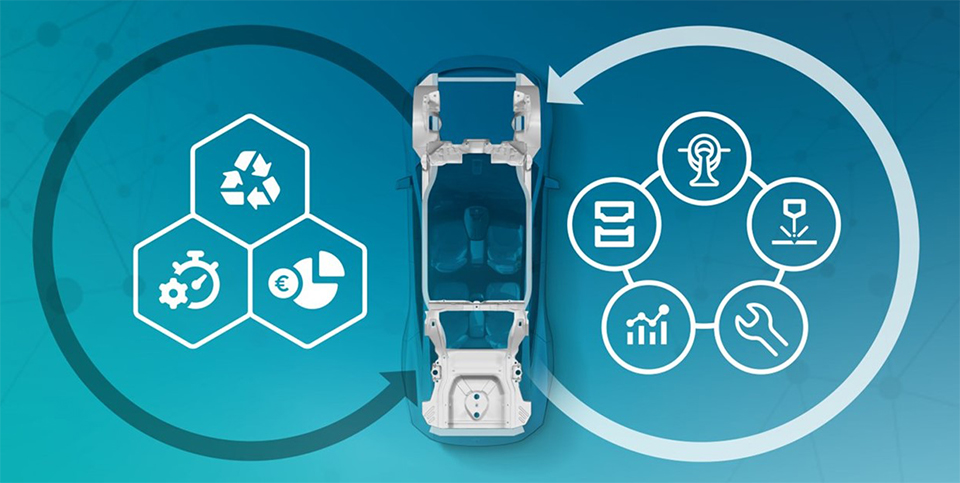Reliability and safety of modern body structures


The flagship project “FutureCarProduction” focuses on the key market of mobility and develops solutions for sustainable and innovative car body concepts. Eight Fraunhofer institutes are investigating how manufacturing concepts for car bodies using state-of-the-art joining and casting technologies can be evaluated in terms of their effects on sustainability and recyclability in order to conserve resources and increase efficiency and performance.
As part of this four-year project, Fraunhofer LBF is working on the design, dimensioning, and reliability engineering of modern vehicle structures. Due to the need for sustainable and reliable components, the investigations have the special goal of describing the influence of manufacturing processes on strength, as well as the influence of alloy compositions. If this is achieved, it will increase the variability when using different manufacturing processes and open up the possibility of using secondary aluminum alloys in a wide range of sustainable and safe products.
Vehicle construction is currently undergoing a transformation characterized by new body construction methods involving highly integrated large castings on the one hand, and efforts to develop sustainable products on the other, in order to achieve the climate targets set for the automotive industry for 2030 and compliance office neutrality by 2050 in a socially equitable, ecologically sustainable, and cost-efficient manner.
As part of the flagship project “FutureCarProduction,” eight Fraunhofer institutes are systematically investigating these two issues and pursuing the goal of evaluating holistic solutions for new car body concepts and the development of new technologies in the conflict between ecological sustainability, technical performance, and costs. The project's solution approach includes a method-based analysis and evaluation of vehicle and car body architectures, taking into account conventional and novel manufacturing processes (casting, forming, joining), material use (use of secondary raw materials),
reusability and re-X processes (including reuse, remanufacturing, recycling), and structural integrity. The Fraunhofer LBF has taken on the task of evaluating structural integrity in terms of structural durabiity and making it designable. The Fraunhofer LBF is therefore investigating not only the influence of manufacturing constraints from casting and joining, but also the effects of different alloy conditions in aluminum die casting and gravity die casting alloys on the reliability of modern car body structures. The findings on the cyclic material behavior of secondary alloys in comparison to primary alloys allow an exact description of component strength and provide input data for stress- and strain-based component design. In conjunction with costs and manufacturability, component performance is the key factor in the evaluation of modern car body structures. By combining knowledge of the design methods for cast and joined structures with local component strength, Fraunhofer LBF creates reliable and safe car bodies.
In addition to component evaluation, Fraunhofer LBF is working on the development of a design tool for the implementation of sustainable, recyclable, and repairable car body structures. This includes the development of methods for holistic, semi-automated life cycle assessment and for the optimization of car bodies, taking into account relevant influences from manufacturing concepts and reliability.
Fraunhofer LBF's task within the project is to design the safety, reliability, and performance of car body structures and to make them mutually evaluable, especially when recycled materials are used. Numerical and experimental simulation methods are used in combination to optimally tailor the composite casting structures to be developed to the specific application in the respective vehicle architecture in terms of lightweight design, service life, damage progression, and safety. This includes selecting the right application-specific car body manufacturing method that offers maximum sustainability and reliability at minimum cost.
Fundamental methods for strength simulation of joints made from structural cast sheet metal and continuous cast sheet metal are being developed to enable the design of reliable and safe joints and to evaluate the influence of recycled material on reliability. For a holistic view, in addition to classic sheet metal construction methods in combination with continuous cast profiles, multimaterial composites based on welding and riveting processes are investigated, but essentially Fraunhofer's own approaches using composite casting “FusionCASTING®” as a highly integrative manufacturing option combining structural casting, continuous casting profiles, and welding/riveting structures are designed and evaluated. The results of the subproject enable wide-ranging and rapid application in automotive engineering in order to select the optimal body manufacturing method for specific vehicle architectures.